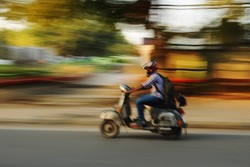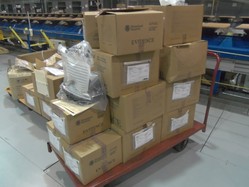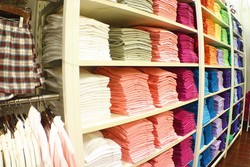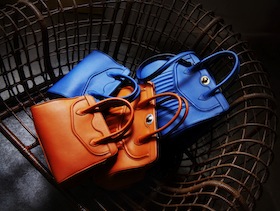Lee Cooper: Production is ‘counterfeit or unauthorised’
LeeCooper declined to be interviewed by Exposure and company executives rejected an offer to view the footage gathered during the investigation. In a brief statement they said: “We employ a strict set of rules to ensure our licensees source responsibly and can confirm that this production is either counterfeit or unauthorised. “We will take all steps to eliminate the unlawful production of Lee Cooper branded products.
http://www.itv.com/news/update/2014-02-06/lee-cooper-production-is-counterfeit-or-unauthorised/
Lear More
India’s carmakers launch campaign against fake parts
Counterfeit automotive components are a major scourge around the world, and India’s carmakers are mounting a public awareness campaign to highlight the problem. SIAM (Society of Indian Automobile Manufacturers) formed an Anti-Counterfeiting Group (ACG) to run multiple online campaigns highlighting the risks associated with what it describes as a ‘tide’ of counterfeit spare parts flooding the Indian market. The trade body has set up a microsite to “create awareness and educate customers about the disadvantages and risks involved in using fake parts for their vehicles,” which could result in costly repairs or even place lives at risk. It also covers validation methods, packaging updates and other best practices to detect fake products
Lear More
Counterfeit Cashmere Clothes Containing Rat Fur Exposed
If it looks like cashmere, and it feels like cashmere, it’s probably cashmere. Then again, it could also be rat fur. This disturbing news surfaced after police in Italy seized more than a million counterfeit clothes Monday, marking the end of a year-long investigation into five Chinese-run firms in Rome. The Italian news agency ANSA reports cashmere coats manufactured and distributed by the companies were actually determined to be comprised of “a mixture of acrylic, viscose and fur from rats and other animals.” After they were manufactured in Rome, the items were distributed by a company near Florence, reports UPI. Fourteen Chinese-born people may face fraud charges as a result. The BBC adds police also seized knockoff merino wool, silk and pashmina garments, presumably also made via similarly dubious manufacturing processes.
http://www.animalsaustralia.org/media/in_the_news.php?article=4982
Lear More
In brief: Yet more seizures in NFL fakes crackdown
Over the last week, federal agents in the US have seized $1.5m worth of counterfeit NFL merchandise at a DHL air cargo facility in Cincinnati. The seizures are the latest to be announced as part of Operation Team Player, which has been carried out by the Customs and Border Protection and Immigration and Customs Enforcement’s (ICE) and resulted in more than $21.6m in seizures leading up to last Sunday’s Super Bowl last week. “Working with our officers, agents and import specialists, CBP prevented the influx of more than 33,000 counterfeit NFL items … from entering our country,” commented Augustine Moore, the agency’s acting director of field operations in Chicago.
Lear More
Aston Martin recalls 17,590 cars due to counterfeit material
Aston Martin is recalling most of its sports cars built since late 2007 after discovering a Chinese sub-supplier was using counterfeit plastic material in a part supplied to the luxury sports carmaker. Aston Martin, which is owned by Kuwaiti and private equity investors, is recalling 17,590 cars, including all of its left-hand-drive models built since November 2007 and all right-hand-drive models built since May 2012, affecting about 75 percent of all vehicles built in that period, a spokeswoman said. The Vanquish is not affected. Aston Martin found that Shenzhen Kexiang Mould Tool Co Limited, a Chinese subcontractor that molds the affected accelerator pedal arms, was using counterfeit plastic material supplied by Synthetic Plastic Raw Material Co Ltd of Dongguan, according to documents filed with the U.S. National Highway Traffic Safety Administration.
http://www.reuters.com/article/2014/02/05/us-autos-astonmartin-recall-idUSBREA141B220140205
Lear More
Baramulla: Police arrest 3 timber smugglers
Baramulla police have arrested three timber smugglers while cutting the green gold in a forest area in Boniyar, a police spokesman said here Tuesday. “Today, acting on a tip off a police party of Police Station Boniyar headed by SHO Police station Boniyar apprehended three timber smugglars Ghulam Ahmad Bhat son of Muhammad Shabir resident Bachi, Trikanjan, Ghulam Nabi Sheikh son of Wali Muhammad Sheikh and Muhammad Maqbool Sheikh son of Ghulam Muhammad Sheikh residents of Ladi who were cutting green timber from forest compartment No 51 at Bachi Trikanjan Boniyar, Baramulla,” the spokesman said. A case FIR No 01 /2014 under section 379 RPC, 6 F. Act was registered against the trio in Police Station Boniyar and investigation has been started.
Lear More

Danish supermarket chain loses fake Ralph Lauren case
A Danish supermarket chain has been ordered to pay compensation to Ralph Lauren after selling and promoting counterfeit copies of its clothes. Last month, Copenhagen’s Commercial and Maritime Court ordered Dansk Supermarked to pay damages to Ralph Lauren of around DKK 200,000 ($36,000) and DKK 25,000 in costs after hearing that its Føtex chain had advertised the fakes to the public in Denmark in brochures distributed to 1.8 million households. Dansk Supermarked claimed it was unaware that the goods were fake, but the court ruled it had not acted with sufficient rigour to determine whether the clothes were authentic and that its buyer should have been able to tell they were imitations.
Lear More

Combating counterfeiting: Encrypted chip adopted by French leather goods brand
The iconic French brand Delage has chosen the Selinko chip solution to protect its luxury leather goods range. The combination of heritage and technological innovation will provide unequalled counterfeiting protection while maintaining the luxurious quality so highly valued by devotees of the brand. The Selinko chip will provide a unique and universally verifiable identity card for every one of its leather items, in order to provide highly secure and innovative protection against counterfeiting and to develop certain marketing services that can be accessed simply by scanning the product with an NFC-enabled cell phone. In 2011, Philippe A de Vilmorin decided to revive Delage’s prestigious automobile brand by developing a range of leather goods inspired by the exceptional car upholstery of the 1920s and 1930s. By adopting the Selinko solution he brings to the Delage brand the best protection against counterfeiting, a problem facing all luxury brands nowadays. The first Delage bags to be fitted with the Selinko technology are expected to be available by June 2014.
http://www.fashionnetasia.com/en/BusinessResources/6321/Combating_counterfeiting_
Encrypted_chip_adopted_by_French_leather_goods_brand.html
Lear MoreCounterfeit e-seller to carry out 200 hours of unpaid work
A Worcester woman was sentenced to 200 hours of unpaid work after she was found selling counterfeit goods over the internet. On 30 January at Worcester Magistrates Court Sharon Proctor pleaded guilty to five counts of breaching the Trade marks Act 1994. This follows a raid on her home by Worcestershire Regulatory Services Trading Standards Officers which was being used to manufacture the goods. The court heard how Miss Proctor was making and selling hooded tops with the JLS logo and T-shirts with the Children In Need logo Pudsey Bear. EBay records show over a short period of around 18 months the 40-year-old has sold 9,592 items with a value of £64,730.
Miss Proctor was also ordered to pay £3000 costs and a victim surcharge £60. When considering sentence the Magistrates said that she was only just below the custody threshold. After the hearing Worcestershire Regulatory Services Joint Committee Chairman Cllr Lucy Hodgson said: “Our Trading Standards officers have shown that illegal activity over the internet will not be tolerated and they have the expertise to track down sellers and bring them before the Courts.
Lear More
Russian Santa Claus residence accused of smuggling reindeer
MOSCOW, February 4 (RIA Novosti) – A Ural Mountain residence of Russia’s equivalent of Santa Claus, Father Frost, has been accused of smuggling reindeer, a media report said Tuesday. A senior veterinary official in the Sverdlovsk Region, where the residence is located, said the outfit’s management illegally transported two reindeer without a proper veterinary inspection and required documentation. Natalya Guryeva told online tabloid Life News that the reindeer were shipped to the region last year to serve as part Father Frost’s entourage at his house outside the regional capital, Yekaterinburg.
Lear More



